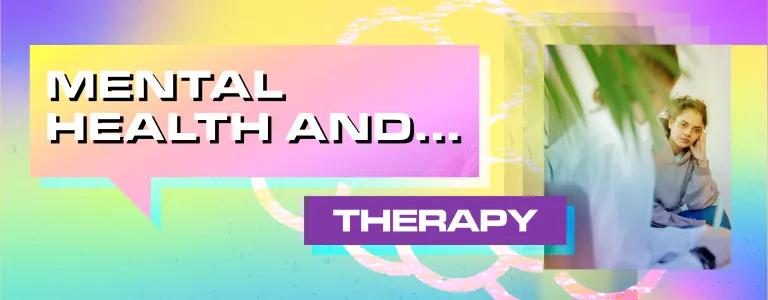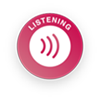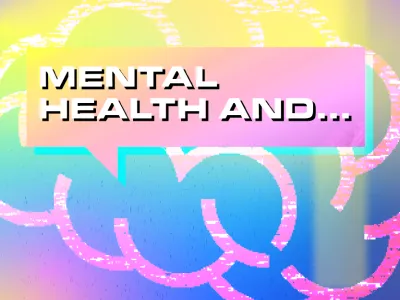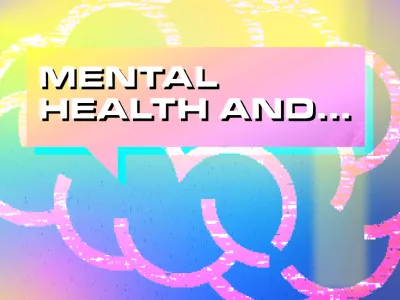
Mental Health And Therapy
Include this article in your Skills Builder Journal. It could help you develop... 

For this instalment of Mental Health and… we spoke to Anne, who’s a licensed counsellor in the UK. Here’s what she had to say about the different types of therapy you can do, why it’s beneficial for your mental health, and how to go about starting your journey…
It can be difficult to make the first step in thinking about and starting therapy. But then there will be no looking back – you’re not going that way, you’re only going forward!
What is mental health?
Mental health is all about how you act, feel and think. When unwanted actions, feelings and thoughts present themselves and create problems, this may suggest that you have issues with your mental health. Did you know one in six young people of a school age have mental health problems? It’s really common and can be affected by lots of different things like stress, medical conditions, changes in your family life, your school life or your friendships. Our brains and bodies are sensitive and we have to take care of them! Luckily, there are lots of ways to do that…

What can I do about it?
Taking part in counselling or therapy can be really beneficial when you’re experiencing difficulty with your mental health. Counselling is usually short term – you’ll work with someone who will focus on finding solutions for a specific problem you’re struggling with now. And therapy is usually longer term – you’ll work with someone who will help you explore the thoughts, feelings and behaviours that impact your mental health and life as a whole.
Talking to someone about your mental health might feel a bit awkward and that’s totally normal. But remember that who you’re talking to is a trained professional, with a whole brain full of knowledge! You can talk to therapists about all sorts of mental health issues, from anxiety to eating disorders, family to sleeping problems, trauma to exam worries. It might seem overwhelming at first, but it’s an important step on the road to recovery.
Therapy will provide you with a place to explore the extent and effect of your situation, and give you the help you need to analyse possible solutions. You’ll consider how your thoughts, emotions and behaviour all interact together and what you can do to move forwards.

Are there different types of therapy?
Yes! When it comes to talking therapies, there are a number of different kinds that you might find yourself doing.
Cognitive Behaviour Therapy – CBT – is one of the most common forms of therapy offered for things like anxiety and depression. For example, if you’re someone who does a lot of overthinking – in a way that challenges your day to day life – CBT can help you think more rationally, and break this cycle.
Mindfulness therapy is also quite common, and often combined with CBT. It uses things like meditation, yoga and breathing exercises to help you focus on your difficult thoughts and feelings rather than avoiding them.
There’s also psychotherapy, which is a more long term process and involves looking back at past events in your life which may be linked to your current mental health problems.
You may find too that within your sessions, your therapist or counsellor will provide different types of learning tools. Not everyone is comfortable going straight in and talking about their feelings! During my client sessions, I have a number of different outlets to get conversations going, or to allow my clients to speak more comfortably – for example, I do a lot of figure work. This is where I present a number of different figures (think along the lines of action men or little zoo animals!) and my client chooses one that best represents how they are feeling. We then talk about what it might represent and why they picked it, and it allows the conversation to progress. Other methods along these lines might be sand tray work – where clients set up a world in a sand tray using objects and figures that correspond to their inner state, or simply drawing or writing feelings down instead of speaking them out.
It’s also important to remember that when you take part in therapy, it’s completely confidential. Everything you say is between you and your therapist. They’re there to make sure you feel safe and to provide a space where you can talk openly and express yourself with someone who is objective and empathetic. They won’t judge you. All they want to do is help you become self-aware and grow in your empowerment and help bring about change so that you can live a life with an improved sense of well-being.

What are the benefits?
Therapy is made to help. And whatever type of therapy you end up using has the same common goal – to help you feel empowered by greater self-acceptance and self-esteem. Therapy will help you better express and manage your emotions and develop fresh insights about your life. It might be challenging, but in the end, it will allow you to make healthier life choices.
If you’re thinking about therapy, talk to your GP first. The NHS offer free services, either through a GP or self-referral. Unfortunately it’s quite common for there to be a long waiting list for these services. However, places like The Mix and Childline, and charities such as Mind offer free, or low cost, talking therapies – sometimes in the form of text message services. It’s also worth checking with your school or college if they have counselling services. And, there is also the option of private therapy, this isn’t an option for everyone though as it can be quite expensive.
If you choose to take on therapy or counselling, just remember that this is the start of heading in the right direction. The only way is up!



